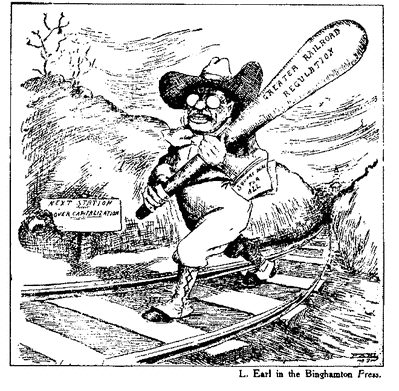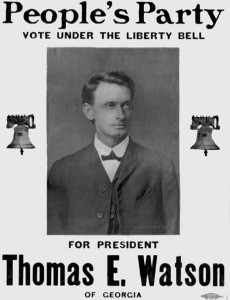By Ryan Moran
POPULISM
In the late 19th century, political parties were popping up like rabbits. With this new influx of political parties came with it, the populist party. The party’s platform, known as the Omaha platform, calls for the riddance of national banks, direct election of senators, an 8 hour workday, a graduated income tax and government control of all railroads, telegraphs and telephones.
At the time of the election government regulation of public transportation was a popular topic. On one side, government regulation was a good thing as prices would stay constant and under control while having no corporate competition. On the other side, government regulation of public transportation was bad as it took away the good spirit of business and possible industry development. It was believed that under government regulation, the development of new railroad innovations would come to a halt. The american government would pay little attention too it as they have many other things to worry about.
PROGRESSIVISM
Railroads would prove to cut travel time by 90% and drastically reduce freight costs with three important economic results. Firstly, they made settling and developing interior territories much easier. For example, in 1869 the first transcontinental railroad across North America was created, converting a treacherous and dangerous journey lasting many months into a smooth trip lasting merely a few days. This would better the link between consumer and producer. Goods could travel from the coast to the inner cities and raw materials could reach factories faster than ever increasing their productivity and product availability. Now that farmers could sell goods across the country rather than simply at nearby markets, farmers no longer had to live near cities. They could live further out due to faster transportation. Farmers would also switch from raising subsistence crops to cash crops better suited for their local soils, which increased crop yields drastically. They could then sell the crops, buy the food needed to feed themselves, and still have money for buying consumer goods. With the constantly growing railroad industry, it became clear that there was a need for some stable control. As corporations monopolized railroads became an issue. It was clear that corporations now had too much control over the economy and there was a need for government interference and regulation. This would be lead by President Theodore Roosevelt in an attempt to dissolve corrupt corporations and trusts.

Cartoon of Theodore Roosevelt and his “Big Stick” preparing to better regulate the railroads and take control.
IMPERIALISM
In 1871, British Prime Minister Lord Salisbury said, “The great organizations and greater means of locomotion of the present day mark out the future to be one of great empires.” This quote by the British Prime Minister shows that the key to the growth of a true empire was the widespread expansion of railroad networks. A nations power would benefit incredibly from these massive railroad networks. Such rapid expansion came with both political and economic effects. Politically, the power of the state grew considerably. Since they were expensive, governments were forced to finance them directly or through massive land grants. Also, everyone wanted railroads to pass through their regions to reap from the financial benefit. At first, this was seen as an impractical thought, and governments often had to step in and decide where the main rail lines should be placed before less profitable rail lines could be made. Finally, rail companies were forced to cooperate with each other for the benefit of the entire business and make each train compatible with the next causing the need of a standard size. This standard would set by the government and was the first government regulation set internally on the railroad corporations. Later, the government would begin to step in and make standard safety prices and rail designs for all corporations to follow. Therefore, as railroads unified their nations economies, the governments directing their development unified their nations politically and increased their own power.
http://www.flowofhistory.com/units/eme/17/FC112
http://www.ushistory.org/us/25b.asp
http://what-when-how.com/western-colonialism/railroads-imperialism-western-colonialism/
http://cs.stanford.edu/people/eroberts/cs181/projects/corporate-monopolies/development_rrmon.html
http://www.digitalhistory.uh.edu/disp_textbook.cfm?smtID=3&psid=4067
